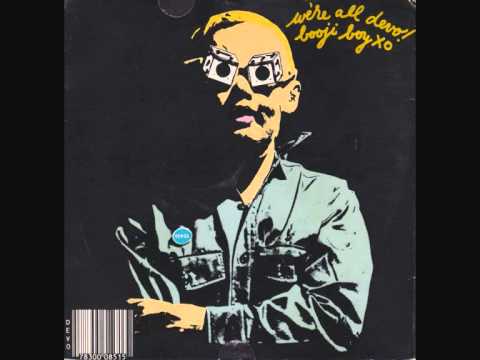Feature Song: Jocko Homo by Devo (March 12, 1977/Booji Boy Records/Akron, OH)
On May 4th, 1970, around 300 students at Kent State University gathered to protest the expansion of the Vietnam War effort into Cambodia. At a little after 12:00 PM, 96 troops from the A Company and Company C, 145th Infantry, and Troop G, 107th Armored Cavalry advanced on the grounds with orders to disperse the students. This was due to some truly paranoid thinking by Kent Mayor LeRoy Satrum and Ohio Governor Jim Rhodes about the activities of the Youth Movement. The powers that be in Kent believed a section of radicalized students had not only begun to stockpile weapons and ammo, but that they were building tunnels so as to plant bombs under local businesses and planning to spike the municipal water supply with LSD. This panic about the nature of the Youth Movement brought 28 National Guard troops to fire 67 rounds into the crowd of students, killing four students and wounding nine others.
At this demonstration was one Gerald Casale, who was there with friends and victims of the shooting Jeffrey Miller and Allison Krause. The traumatic event would be the catalyst for his transformation from hippie to proto-punk, as he began to ruminate on the idea that the human race had begun regressing. This idea resonated with classmate Bob Lewis, with whom Casale would begin to work on the concept of "De-Evolution." Around this time, they met Mark Mothersbaugh, another art student, who held a fascination with kook pamphlets. To him, this concept of De-Evolution reminded him of Jocko-Homo Heavenbound, a 1924 anti-evolutionary tract by Ohio minister Betram Henry Shadduck. At the time, the trio were involved in other projects, like experimental blues outfit 15-60-75 and art pop group Flossy Bobbitt. In 1971, Lewis, Casale and Peter Gregg recorded I Been Refused , I Need A Chick, and Auto Modown on primitive recording equipment above a pizza shop in Kent, Ohio. These three songs would be the blueprint for what was to come later.
In 1973, after graduation, Gerry, Bob, and Mark teamed up with Casale's brother Bob and friends Ron Reisman and Fred Weber to become The Sextet Devo, named after an illustration in Jocko Homo Heavenbound. However, this lineup only performed once at the 1973 Kent State Performing Arts Festival, before The Sextet Devo took on a more fluid lineup, including Mark's brothers Bob and Jim (Yeah, 3 Bobs in one band). With the lineup in constant flux, they removed the Sextet part of the name. The newly rechristened Devo was about more than just the music, however. They truly embraced the art aspect of what they were doing, developing not only a unified stage look, but a mythos and characters like Booji Boy who would eventually be 'explained' in the 1976 short film In The Beginning Was The End: The Truth About De-Evolution. These early days of Devo would include a very tense, almost antagonistic relationship with the audience. For example, when they performed Jocko Homo live, they would often repeat the call-and-response section in the bridge for upwards of 30 minutes at a time, just because it was fun to them.
Devo are interesting guys, and I'll get into them more later, but they were at the forefront of a growing experimental and art-rock scene in Ohio for a while. Dozens of other bands playing similarly art-focused music popped up in the state. However, I want to write about about one other group from this period.
Rocket From The Tombs were a band from Cleveland that lasted from 1974-1975 and played some seriously heavy stuff. Their music dealt with usual punk themes, like dissatisfaction and alienation and abuse. However, they also delved into suicide and evoked some Nazi elements. In a way, Rocket From The Tombs took the macabre aspect of earlier acts like Screamin' Jay Hawkins and Alice Cooper and brought that into Punk, laying some of the groundwork for a later outgrowth we now call Goth. By mid 1975, the group was straining against each other creatively, and called it quits. Despite their short tenure, Rocket From The Tombs is one of the most important punk acts to ever grace any stage. After their implosion, guitarist Gene O'Connor (Cheetah Crome) and drummer Johnny Madansky (Johnny Blitz) would join singer Steven Bator (Stiv Bators) to become punk icons The Dead Boys . Singer/bassist David Thomas (Crocus Behemoth) and guitarist Peter Laughner would form goth/industrial pioneers Pere Ubu . Craig Bell (Darwin Layne) would go on to perform in a number of punk and new wave acts over the years as well.
I wanted to get these bands out of the way before I drift away from the United States so I could give a decent explanation for what punk rock represented in its birthplace. While we think of punk as this politically-charged force of the mid-70s, it wasn't really that way. Early punk was an artistic statement more than a political one. It was musical Dadaism, using primitive recording techniques, abrasive sounds, bizarre time signatures, and rejecting basic ideas of what makes pleasing music. And all of this was seen as a rejection of the "intellectualization" of rock and pop throughout the 1960s. Punk also rejected notions about ideology, refusing to offer up beliefs more complicated than "The current order is bad and it needs to be demolished." In a nutshell, the ideology of early punk was reactionary, and it only became radical again after it left the United States as a finished product.
Next Time: The Demise Of The Dolls and The Inception of UK Punk



Believe it or not, Devo collaborated with Neil Young in '78 on a cover of Hey Hey My My. Booji Boy also shows up in Neil Young's movie Human Highway